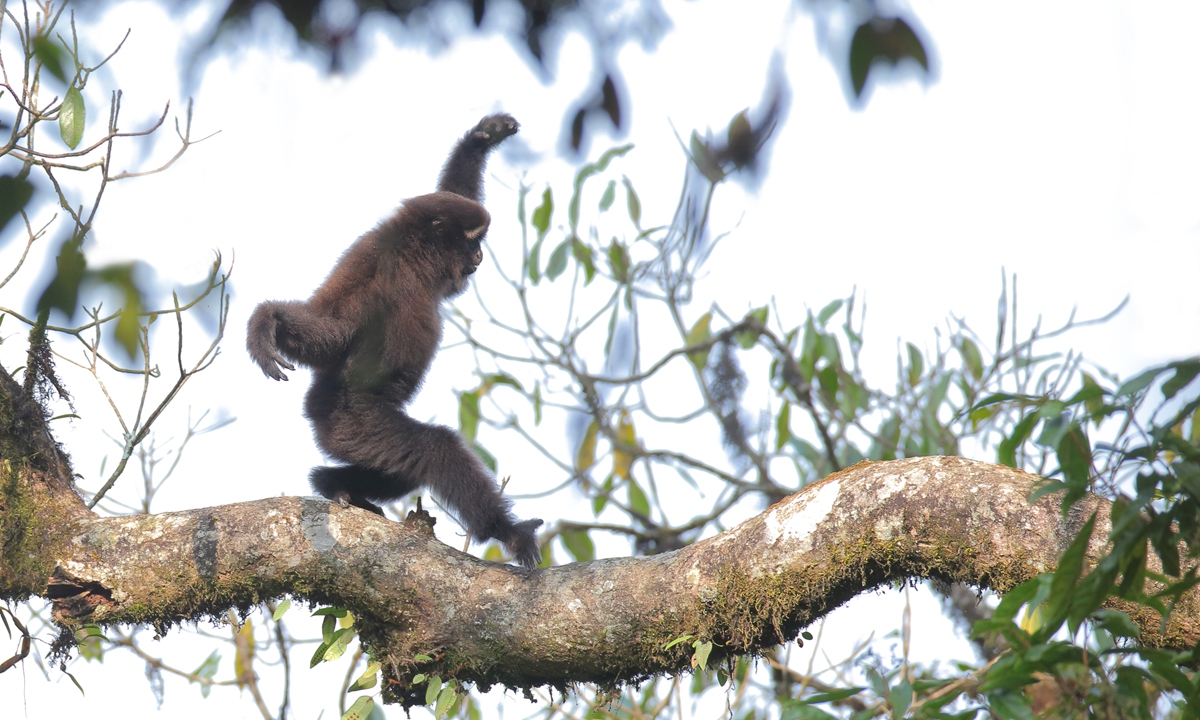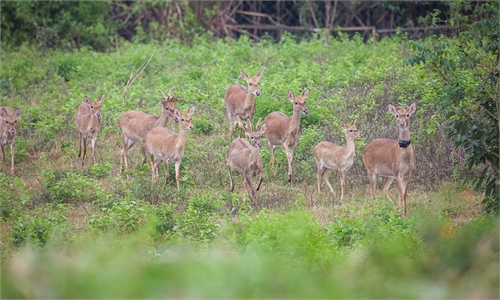Biodiversity conservation in China has improved but more efforts are needed: Chinese conservationists

Photo: Courtesy of Zhao Chao, founder of Naturewin
China's biodiversity conservation and environment protection awareness has been growing thanks to increased government investment and local online crowd funding. However, more realistic actions are needed from officials and the public, said a frontline conservationist and protector of the endangered gibbon in China.
Yan Lu, cofounder of Cloud Mountain Conservation, shared her views with the Global Times ahead of the celebration of the International Day for Biological Diversity on Saturday. The Cloud Mountain Conservation is a non-governmental organization (NGO) dedicated to the protection of gibbons in China. With less than 1,500 left across the country, wild gibbons are fewer than giant pandas.
The organization gained the public's attention after Fan Pengfei, cofounder of the NGO and professor at Sun Yat-sen University, discovered a new species of gibbon in Southwest China's Yunnan Province in 2017, which he named the Skywalker hoolock gibbon.
A frontline conservationist and operator of an NGO for one of China's most threatened creatures, Yan has personally experienced the changes in the country's biodiversity conservation awareness over the years.
"The growth of online crowd funding platforms and an increasingly stronger funding from tens of millions of Chinese netizens have provided growing financial support to us and other grass-roots level NGOs that joined our cause to protect wildlife," she said.
Sina Weibo, Wechat and Alipay are the main platforms where conservationists and the general public can donate money to Cloud Mountain Conservation, she said, adding that the resources collected from crowd funding can be more than half of the total annual income of the organization.
Song Dazhao, founder of the Chinese Felid Conservation Alliance, shared the same experience. He told the Global Times on Sunday that the organization has seen a growing proportion of online crowd funding in its total income over the years, reaching nearly 50 percent.
The introduction of a series of reforms and policies by the government in recent years has also changed China's status in the protection of the environment and conservation of the biodiversity, according to Yan.
"The new policies and measures the government introduced for wildlife protection, such as setting ecological thresholds, have provided guidelines for officials from different organs to implement biodiversity conservation guidelines. These actions indeed showed the determination of the government," she said.
China is the the third-most biodiverse country in the world with with over 34,000 unclassified species of animals and plants, according to International Union for Conservation of Nature (IUCN).
However, it is also among the countries with the most threatened species, with more than 1,000 known species in the country that are categorized as critically endangered, endangered, or vulnerable, according to the IUCN.
To enhance the national efforts in protecting biodiversity, China issued a reform plan in 2015 to increase accountability for officials at all levels and in different fields, and established the National Committee on Biodiversity Conservation in December 2020 to strengthen the departmental coordination and linkage from top to bottom.
The country has effectively protected 90 percent of plants and terrestrial ecosystems, 65 percent of higher plant communities and 85 percent of key wildlife populations over the past 40 years since its accession to the Convention on International Trade in Endangered Species of Wild Fauna and Flora, according to Zhang Zhizhong, Director of the wildlife protection department of China's State Forestry and Grassland Administration.
The population of rare and endangered species of animals and plants, such as the giant panda, the crested ibis, and cycas and dove trees, have been recovering and growing, he said.
Although much progress has been made in China's environmental protection, the lack of public awareness about endangered species and environmental protection, as well as the absence of concrete actions from government officials, remain the main obstacles for China to join the team of developed countries that champion biodiversity conservation, Yan noted.
"Surely it is hard to see a big change within a short time, the government can at least gradually increase the priority level of wildlife protection in their overall work plan and try to have a deep understanding of the relevant policies before implementing them," she said.
Song told the Global Times that the only problem for China's biodiversity conservation lies on how to take concrete actions, even though the investment and attention made by the government and the public has improved to a large extent compared with 10 years ago.
China will hold for the first time the 15th meeting of the Conference of the Parties to the Convention on Biological Diversity (COP15) in October in Kunming, Yunnan, one of the cities with most biodiversity in the country.
Both conservationists said they have been actively preparing for the conference, along with many other Chinese local NGOs, under the guidance of the Ministry of Ecology and Environment and relevant foundations.
"It is a very important achievement for our country to get the right to host the COP15 at the current time," said Yan, noting that Cloud Mountain Conservation will present a few cases of their project on endangered gibbons in China.
Despite being one of the first countries to join the Convention on Biological Diversity, China's actions and progress in wildlife protection and biodiversity conservation have long been neglected and sometimes even misunderstood by the world. Therefore the COP15 is a good opportunity for the Chinese government and NGOs to showcase the achievements gained today, she said.



